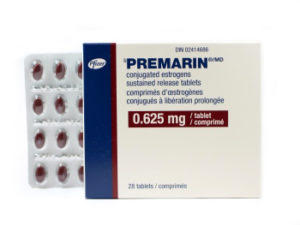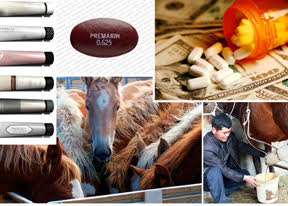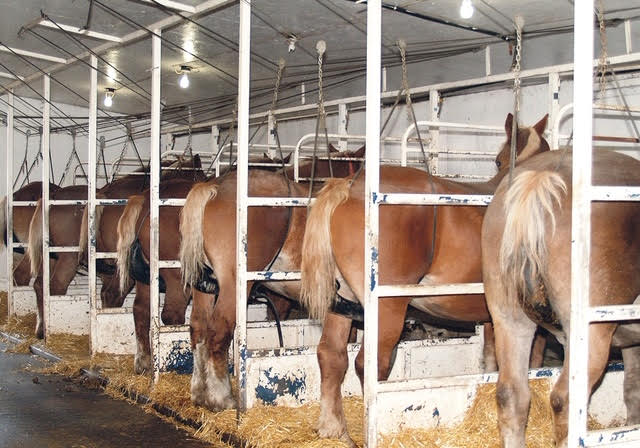Premarin is an estrogen-replacement drug. It is used for treating menopause symptoms and to prevent osteoporosis. It is also used to replace estrogen in women with ovarian failure. The drug’s name is short for PREgnant MARe’s urINe (PMU). This name tells you that premarin is made from horse urine, specifically pregnant mares. Although the number of PMU ranches in the U.S. and Canada have decreased in recent years, Pfizer is still producing hormone replacement therapy drugs. At the height of the industry in the 1990’s, 750,000 mares were being impregnated each year for the sole purpose of collecting their estrogen-rich urine.

To develop the drugs using the urine, horses are subjected to horrific cruelty. As a prey animal, horses have a heightened sense of the fight or flee reaction necessary for a prey to survive. Because of this protective instinct, horses are wanderers by nature. A PMU mare is tied in a small stall that is only 4 to 5 feet wide with a tube attached to her groin to collect the urine. In this condition, she is unable to move but maybe a step or two forward and back but not turn around or lie down. The tube causes sores on her legs as well as the tight space. Her food and water intake are restricted in order to concentrate the urine so she is constantly thirsty. She is kept in this stall for 6-7 months until the end of her pregnancy when the estrogen levels decrease and it is no longer financially prudent.

After the birth of her foal, she is impregnated again and her foal is taken from her at 3 months of age. Mares are reluctant to give up a foal this young so they are often whipped or beaten with an electric cattle prod until she relents. She is then subjected to the stall again. This cycle repeats for up to twelve years. Not surprisingly, PMU mares have many health issues such has dehydration, hoof injuries, leg sores, swollen joints, edema, liver and kidney disorders and premature death. In addition, her stress level is at a constant high as she is unable to flee her deplorable conditions or care for her foal. Mares are sent to the slaughterhouse when they are unable to reproduce quickly. Not only do the mares suffer in a PMU ranch, the foals are considered by products of the industry and deal with horrible treatment as well. A foal suffers its first highly stressful situation at three months of age when weaned too young and removed from its mother.
Some females are kept as replacement mares if their mother is no longer able to reproduce. Most foals are sent to auction, along with the mares whose production has ended. They can be bought for recreational use but most are bought by kill buyers who send them to feedlots to be fattened up for slaughter. Horse meat sells well in Japan or Europe. In 2002, a study was done that concluded the use of PMU drugs is dangerous for humans. The study showed that stroke risk was increased by 41%, heart attack risk by 29% and breast cancer risk by 29%. It also concluded that hormone replacement therapy drugs have no meaningful effects on menopause symptoms.
At the time of the study, many doctors in the U.S. and Canada stopped prescribing PMU drugs, thereby reducing the number of mares needed to continue producing but not ending it completely. Despite this study, more research has been conducted and the common thread now is that HRT helps for short term but is dangerous taken long term. Therefore, HRT drugs are still prescribed. Because this study put the HRT drugs in the limelight, the conditions of the PMU ranches also became more known and local regulations started appearing. As of 2019, the number of PMU ranches is down from 500 in the 1990’s to 19 in Canada and none in the U.S.A. However, Pfizer saw what was coming and began moving production abroad (China, Poland and Kazakhstan) where regulations are more lax and less inspectors available to monitor production.
This move resulted in more terrible conditions for the mares and less oversight in the manufacturing of an already dangerous drug. To help end the manufacture of this drug and the horrible abuse of the mares needed to produce the drug, we can do a few things. First and foremost, don’t take Premarin. There are alternative humane drugs that a woman can request from her doctor. Also, a healthy diet and lifestyle will help to mitigate some of the menopause symptoms without the use of drugs. And, lastly, we can make some noise and educate others.
https://www.lcanimal.org/index.php/campaigns/other-issues/horses
http://www.nbcnews.com/id/3995076/ns/dateline_nbc/t/hrt-horses/#.Xo5TW1NKjOQhttps://www.producer.com/2019/04/pmu-ranchers-feel-pinch-as-cuts-announced/

